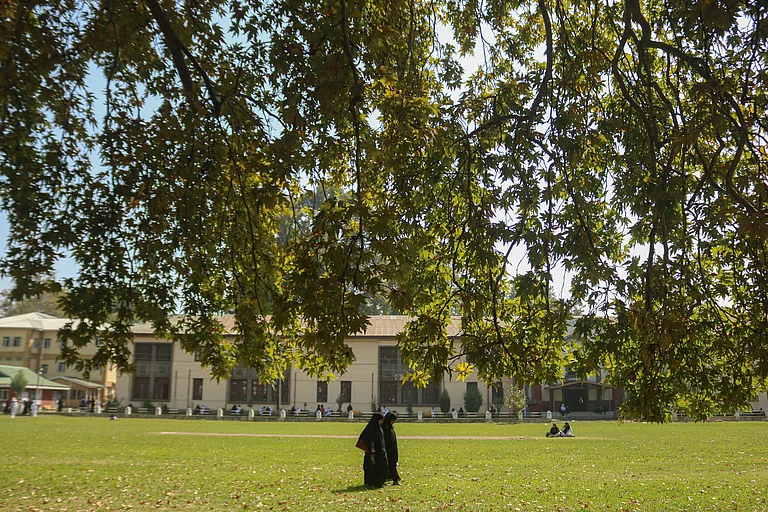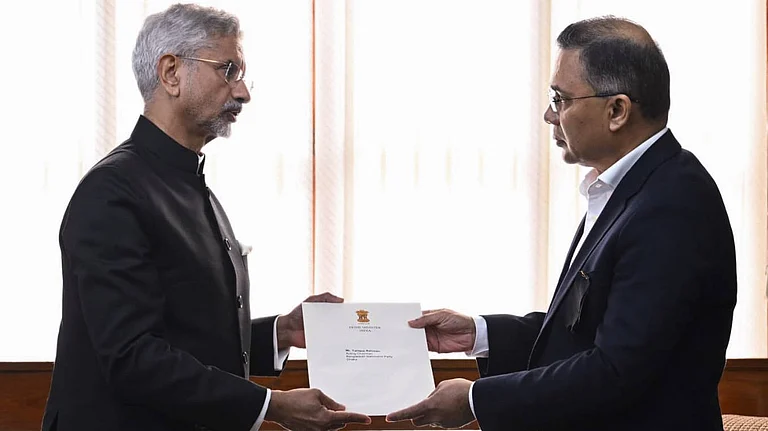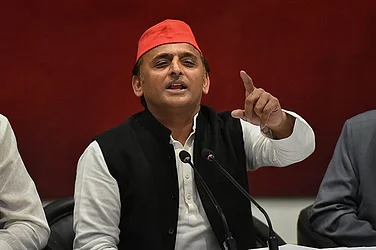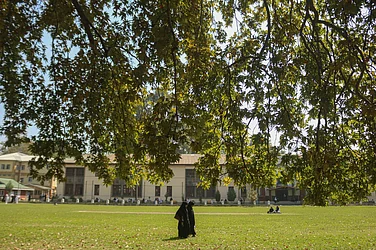A sophisticated gentleman accosted me by name at a party in Delhi, as he had seen my picture in a newspaper or magazine. I had recently published my third novel, Filming: A Love Story, to some critical acclaim. He was obviously the kind of person who followed talk of literature and culture. He knew that before moving to Denmark, where I was then (and now) an academic, I had worked for the Times of India in Delhi. He asked me when I had graduated from JNU (Jawaharlal Nehru University), perhaps influenced by the slant of some of my writing. “I never went to JNU,” I replied.
“Ah,” he exclaimed, “You are a Delhi University alumnus!” “No,” I replied, politely, “Didn’t go to DU either.”
There was a moment of hesitation, and then the gentleman, almost despite himself, offered a third alternative, this time probably influenced by my name: “Jamia?”
I had an almost identical conversation with a sophisticated lady at the Jaipur Literature Festival a bit later. I think that was after the publication of The Thing About Thugs. In both the cases, my interlocutors could obviously not imagine that I had finished my schooling, Inter, BA and MA from my hometown, Gaya, in Bihar.
Because that is the kind of reputation Bihar has over the rest of the country: it is a state people leave for education and career opportunities. Some of the reputation is justified; some not. However, what is not justified is the kind of fun that may be poked at Biharis in other parts of India, especially in the tone-setting metropolitan regions of Delhi and Mumbai.

Now, let me be honest about it. I have lived or travelled for substantial periods in other countries, and I know that people everywhere poke some fun at their fellow countrymen from other regions, and usually from predominantly agricultural regions of that country. In Denmark, for instance, people from Jutland—the biggest, largely agricultural region, which is physically part of the European continent—are often made the butt of jokes in and around Copenhagen, which happens to be on an island drifting towards Sweden. But the sheer extent—and at times crudity—of ‘ethnic jokes’ that percolate in India remains, to my mind, unmatched. It does not just effect Biharis. We are all familiar with ‘Sardarji’ and ‘Mallu’ jokes. Many of these slip from good-natured ribbing to outright denigration.
It is difficult to tabulate exactly where such joking slants from good-humoured and perhaps inclusive fun to something morbid, fatal and xenophobic. I will not try to do so in a short essay. But I will look at three tragedies that have taken place recently and then ask a few questions about them.
The first one is the migrant labour crisis in India following the coronavirus lockdown announced, with almost no notice, by the Centre. The World Economic Forum estimates that there are 139 million migrants in India, though of course the consequences of the crisis were felt most heavily by manual and daily-wage migrant workers. We know that Uttar Pradesh and Bihar supply the maximum number of migrant workers to the country, and there is some evidence that a greater share of manual and daily-wage earners come from Bihar.

Migrant workers suffered terribly during the lockdown. Most were from Bihar and UP
The second tragedy is that of Sushant Singh Rajput, a rising film star who was reported to have committed suicide at the age of 34. Apart from being a promising actor, he was a gifted student and had been a talented athlete. He was also born in Patna, and his family hailed from Bihar’s Purnia district.
The third one is the death of at least 20 Indian soldiers and officers in Galwan Valley on the night of June 15, reportedly after a conflict with Chinese forces. “Seventeen Indian troops who were critically injured in the line of duty at the stand-off location and exposed to sub-zero temperatures in the high-altitude terrain have succumbed to their injuries, taking the total that were killed in action to 20,” the Indian army said in its official statement. These brave patriots were from 16 Bihar Regiment; some were from Bihar and some from other states.
Now the questions. Would the plight of migrant workers have been neglected for as long as it was, before some remedial action was ordered, if privileged states, like say Gujarat, had been more heavily affected? Would Rajput’s reception in the Bombay film industry—and the trolling that he seems to have received—have been different if he had not been seen as a Bihari, and would that have given him the extra support that all victims of depression require?
Note, Rajput was from a professional family, so it was not his class status but his regional background that must have been a factor both in his reception in Bollywood and in the tendency, exacerbated after his death, to obscure his mental health issues. Bihar, as I know from experience, is one of the worst states in which to fall ill—and mental health issues are particularly neglected. And finally, why is it that soon after the Galwan Valley tragedy, at least some ‘nationalist’ TV anchors and social media fanatics appeared to blame the martyred soldiers? I found it insensitive and shocking. Was it because the regiment was seen as associated with ha-ha Bihar, a state whose citizens can be ridiculed with impunity? Would they have adopted a similar approach to a regiment of Sikhs?
In short, all those ‘Bihari’ jokes might not be as innocent as we assume, because they often reduce Biharis to much less than what we are. As Judith Butler notes, once we have reduced the humanity of a person, it is easy to accept whatever happens to him or her. One of the things that jokes do is socialise others: when you share a joke, you become a community. But another of the things they do is ostracise others—even to the extent of forcing them to strip themselves of language or identity.
Bihari jokes—and Biharis, I must concede, accept them with almost no ill-will—usually focus on the Hindi ‘dialects’ spoken in Bihar. Laloo Yadav, the ex-CM of the state, was once very popular as a side-show on national TV because of his ‘accent’: it is to Mr Yadav’s credit—and I guess there was a degree of political mileage in it for him inside Bihar—that he increasingly assumed this persona of the ‘rustic’ Bihari speaker. Most Biharis, however, try to get rid of their ‘accent’ the moment they leave the state. Especially the professional ones. The first thing they do is switch the standard Bihari Urdu/Hindi word for I, ‘hum’, with the Western UP-Delhi-Punjabi equivalent, ‘main.’
I grew up in an old Urdu-speaking family, and we always used ‘hum’. But as family members moved out of the state—all of them were professionally educated, mostly engineers and doctors—they inevitably switched to ‘main.’ So did I, during my initial years in Delhi. The switch was easy for members of families like mine, as we spoke mainstream Urdu (or, I suppose, in Rajput’s case, mainstream Hindi), not some language that would be dismissed as a ‘dialect.’ Later, I switched back to ‘hum’, as a marker of linguistic identity—just as ‘khuda hafiz’ is and is not ‘allah hafiz’, ‘hum’ is and is not ‘main’—and because I realised, in the words of Max Weinreich, that “a language is a dialect with an army and a navy.”
Bihar, of course, does not have an army. Perhaps the best study of the state, Arvind N. Das’s The Republic of Bihar, argues that late medieval Bihar never developed the higher institutions of feudalism that aggregated around, say, Delhi or Lucknow. Under the British too, Das notes, the so-called ‘kings’ of Bihar were nothing other than large landlords. This must have had a bearing on Bihar’s lack of prosperity and cultural prestige. In that sense, one can say that Bihar never had an ‘army’ and, lacking a sea shore, had no chance of maintaining a real ‘navy.’ Even less so, in recent years, as the Ganges was dammed and diverted further north, so that what reaches Bihar is either a trickle or a flood, never a proper river! This is of course a poor present in contrast to the ancient and Magadhan past, when, as a legend puts it, the Buddha had prophesied that the region would always be very prosperous but afflicted by flood, fire and internal dissension.
As a Bihari, I sometimes suspect that the Benevolent Buddha was half-joking too.Or was he being kind?
ALSO READ
(Tabish Khair, the author of several novels, poetry collections and non-fiction works, teaches at the University of Aarhus, Denmark. Views expressed are personal)


























